Match species given in Column-I with the electronic configuration given in Column-II
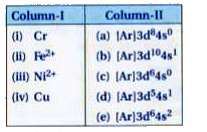 Solution in Gujrati
Solution in Gujrati
Both A and R are true and R is the correct explanation of A.
Both A and R are true but R is not the correct explanation of A.
A is true but R is false.
Both A and R are false.
(i-d ) , (ii-c ), (iii-a ), (iv-b )
Topper's Solved these Questions
- STRUCTURE OF ATOMBOOK - KUMAR PRAKASHANCHAPTER - STRUCTURE OF ATOMEXERCISE - QUESTINS PAPER FROM MODULE (SECTION -A)
6 Videos
- STRUCTURE OF ATOMBOOK - KUMAR PRAKASHANCHAPTER - STRUCTURE OF ATOMEXERCISE - QUESTINS PAPER FROM MODULE (SECTION -B)
3 Videos
- STRUCTURE OF ATOMBOOK - KUMAR PRAKASHANCHAPTER - STRUCTURE OF ATOMEXERCISE - Section -C(MCQ asked in Board Exam )
53 Videos
- STATES OF MATTER BOOK - KUMAR PRAKASHANCHAPTER - STATES OF MATTER EXERCISE - QUESTION PAPER FROM MODULE (SECTION - A)
4 Videos
- THE P-BLOCK ELEMENTSBOOK - KUMAR PRAKASHANCHAPTER - THE P-BLOCK ELEMENTSEXERCISE - SECTION-D NCERT EXEMPLAR SOLUTION (MCQs) LONG ANSWER
25 Videos
Similar Questions
One bivalent ion has electron configuration 2, 8, 8, 6, its atomic mass is 56. Calculate the number of neutron in it.
View SolutionCalculate the mass of photon having 3.6A wavelength. (h = 6.626 x 10~34 Is, V = 3 x 108 ms"1)
View SolutionThe hydrogen electron de-exites from its 3rd excited state. W hich are tru e and false statem ents for it. Assign T for true and F for the false. (i) It emits the radiation giving the lines in the Lyman Balmer and Paschen series. (ii) It emits radiation of only UV and visible regions and not infrared region. (iii) It em its the ra d ia tio n of sm allest wavelength giving the line in Lyman series. (iv) It will emit the radiation of the highest frequency giving line in Pfund series
View SolutionGiven Dalton.s Law of partial Pressure, its mathematical formula and explain aqueous tension.
View SolutionDescribe the general trends in the following properties of the elements in Groups-13
Atomic size
View SolutionMatch the species given column I with prooperties given in column II

View SolutionElectronic configuration of some elements is given in Column I and their electron gain enthalpies are given in column-II. Match the electronic configuration with electron gain enthalpy.
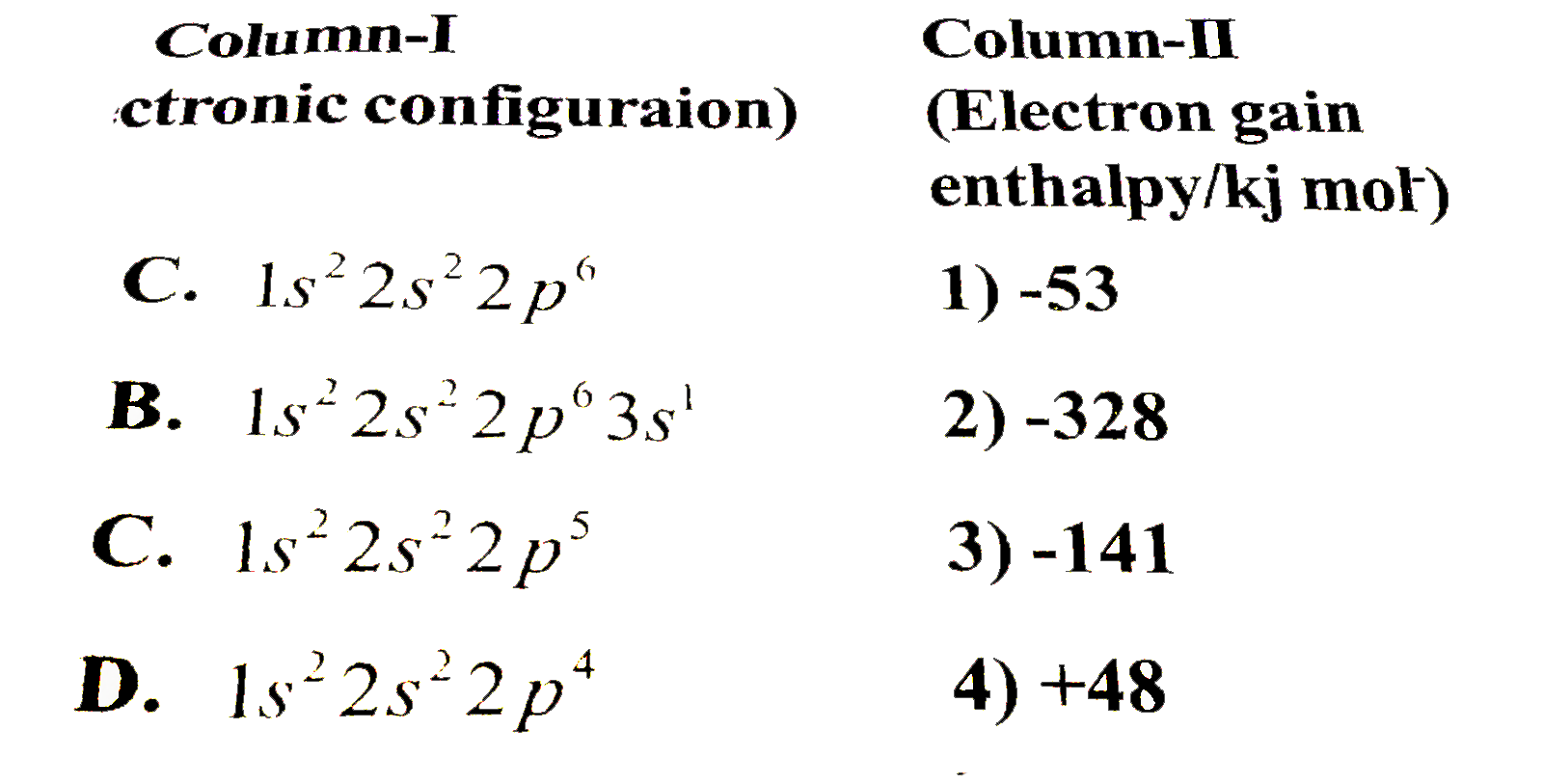
View SolutionMatch species given in column I with the electronic configuration given in column II.
View SolutionMatch the species given in column I with prperties given in Column II.

View SolutionMatch the species given in Column I with the hybridstion given in Column II.
View SolutionMatch the electronic configuration in Column-I with the ionisation energy in Column-II (in KJmole)
View SolutionMatch species given in column I with the electronic configuration given in column II.
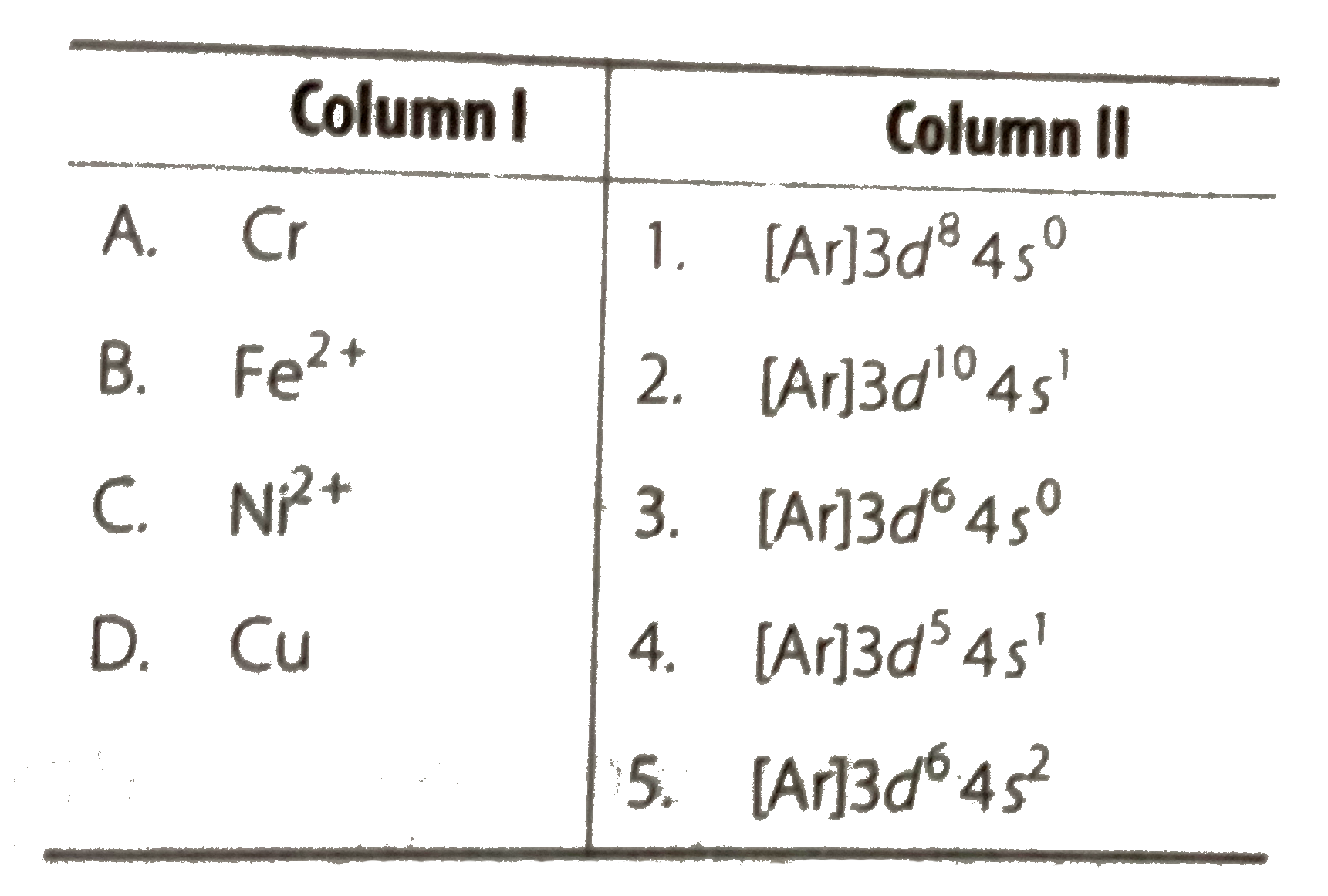
View SolutionElectronic configuration of some elements is given in Column I and their electron gain enthalpies are given in column-II. Match the electronic configuration with electron gain enthalpy.

View SolutionElectronic configuration of some elements is given in Column-I and their electron gain enthalpies are given in Column-II. Match the electronic configuration with electron gain enthalpy.
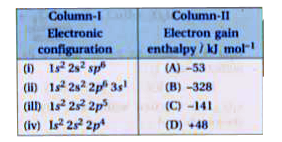
View Solutionकॉलम-I में कुछ तत्वों का इलेक्ट्रॉनिक विन्यास दिया है और कॉलम-II में उनकी इलेक्ट्रॉन लब्धि एन्थैल्पियाँ दी गई हैं| इलेक्ट्रॉनिक विन्यास को इलेक्ट्रॉन लब्धि एन्थैल्पी के साथ सुमेलित कीजिए|
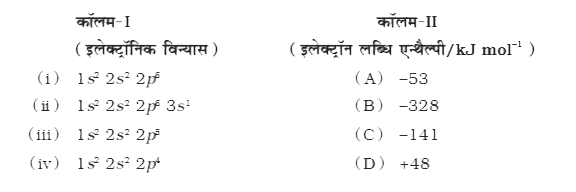
View Solution
